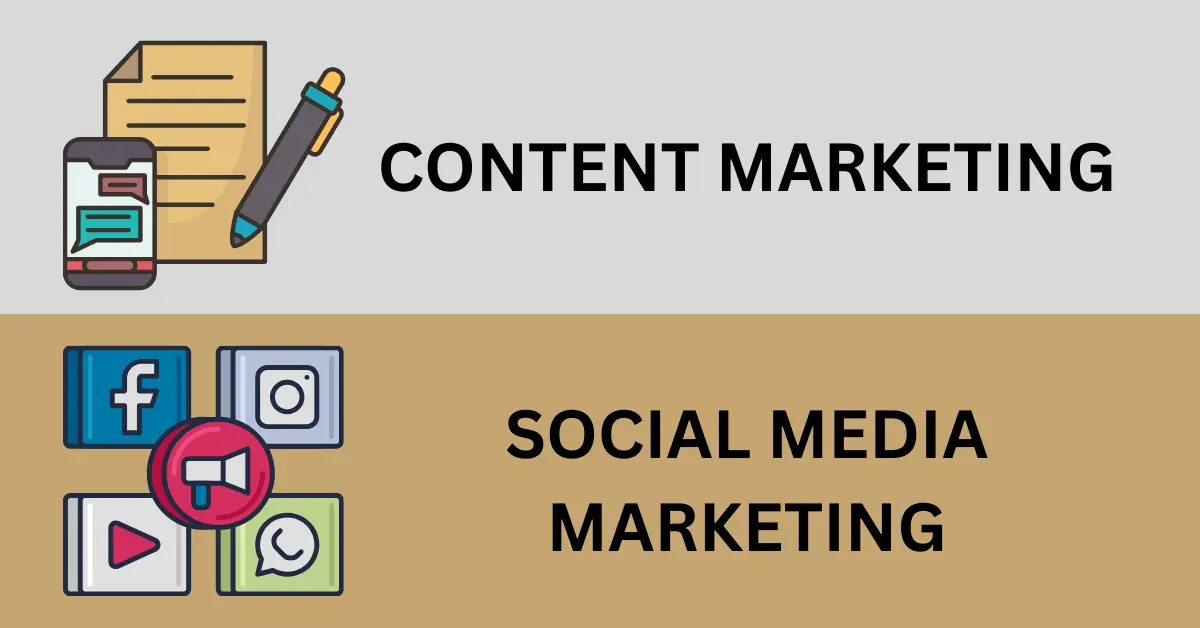Table of Contents
ToggleIntroduction
Two tactics stand out in the huge world of digital marketing: content marketing and social media marketing.(content marketing vs social media marketing) These strategies, though they are different, have a lot in common when it comes to building brand awareness and interacting with consumers. Your online presence and client interactions can be greatly impacted by comprehending the unique characteristics of each and successfully integrating them.
Understanding Content Marketing and Social Media Marketing
The technique of creating helpful and relevant information, including as blogs, videos, and infographics, to instruct and motivate your audience is known as content marketing. On the other side, social media marketing makes the most of websites like Facebook, Twitter, and Instagram to connect directly with customers, establish brand loyalty, and raise brand awareness.
In order to build trust and brand loyalty, content marketing focuses on establishing credibility and authority in your industry. The direct communication emphasised by social media marketing enables businesses to address customer experiences, manage criticism, and form close bonds with their clientele.
Let’s examine each strategy’s distinctive qualities and advantages in more detail now that we understand their basic principles.
Exploring Content Marketing
By combining intriguing storytelling, eye-catching images, and educational blog entries, content marketing shines as a light of creativity and strategy in the digital world. It takes more than just creating content to construct a narrative that connects with your audience and makes a mark in the echo chamber of the internet.
The art of creating is where content marketing begins. It involves turning concepts into persuasive blog entries that grab readers’ interest right away. It involves creating scripts for videos that not only highlight your goods but also create a narrative and evoke feelings that last when the screen goes dark. Vibrant infographics that offer complex facts in an easily consumable style are included in the content canvas, appealing to the visual preferences of contemporary consumers.
Content creation is a scientific as well as an aesthetic work, though. Enter the world of search engine optimisation (SEO), a discipline that ensures that your material stands out on the search engine results page by carefully selecting and strategically placing keywords. SEO is more than just a technicality; it’s the magic wand that makes sure the correct people see your content. It involves comprehending the subtleties of search algorithms and consumer behaviour in order to create content that is not only interesting but also simple to find.
The foundation of content marketing is trust. It’s about becoming the go-to expert in your field for insights and knowledge. You establish your brand as a thought leader by continuously offering quality content. Your audience trusts your material more than just reading it. They have faith in your knowledge, perceptions, and suggestions. This trust is the cornerstone of brand loyalty, guaranteeing that your audience returns again and time again in search of information as well as items.

Navigating Social Media Marketing
Social media platforms provide a variety of ways to engage. Each network caters to a different demographic, from the Instagram’s visual attraction to Twitter’s lightning-fast exchanges. Effective social media marketing is defined by direct involvement, response, and relatability.
Paid social media promotions provide tailored campaigns, ensuring that the proper audience sees your message. The instant effects of social media advertising can boost brand visibility, improve revenues, and drive traffic.

Content Marketing vs Social Media Marketing: A Comparative Analysis
Building long-lasting credibility and trust is where content marketing truly shines. Social media marketing, in contrast, provides immediate gratification and the chance for viral spread. Your marketing efforts will be maximised by combining these advantages, serving both immediate objectives and long-term brand building.
Even though it takes time and dedication, content marketing eventually produces rewards that are both enduring and affordable. Time-sensitive promotions are great for social media marketing, which offers quick returns on investment, particularly through targeted advertising.
After looking at the advantages of social media marketing and content marketing separately, let’s see how combining these tactics may build a strong online presence.
Integrating Content and Social Media Marketing
The real power in the constantly changing world of digital marketing rests at the nexus of social media marketing and content marketing. Integrating these tactics is more than simply a question of convenience; it’s a calculated move that can elevate the digital presence of your brand from average to spectacular.
Think of the history of your company as a tapestry. The intricate details are woven into a narrative via content marketing, which resonates with your audience. Contrarily, social media serves as the colourful thread that weaves together the various pieces of this tapestry to form a captivating and cogent narrative. You may develop a unified marketing plan that strengthens your brand message across all channels by matching your content and social media initiatives with your overarching business objectives.
Consistent branding: Consistent branding is the cornerstone of integration. All material and social media platforms should effortlessly reflect the identity, values, and messaging of your brand. Your audience should instantly recognise the familiar tone and style that define your brand, whether it’s in a blog post, a tweet, or a Facebook update.
Cross-Platform Promotions: By combining social media marketing with content creation, you can easily advertise your material on a variety of channels. Sharing a blog article on social media platforms like Facebook, Twitter, LinkedIn, and even Instagram allows you to reach a wider audience and spread your material further. This cross-platform marketing makes sure that your carefully created content spreads across the wide social media landscape, not just within the confines of your website.
Cohesive Storytelling: Integration makes it possible to tell coherent stories. Consider introducing a product. Through teaser blog posts and in-depth articles that showcase the features and advantages of the product, content marketing can create anticipation. Social media may support this narrative by disseminating entertaining videos, user reviews, and behind-the-scenes photos. Together, they produce a thorough narrative that enthrals your audience and keeps them waiting impatiently for the product launch.
Integrating social media with content marketing is similar to conducting an orchestra, in fact. The harmony of each component—content, social media platforms, audience preferences, and analytical tools—creates a tune that reverberates throughout the digital world. Reaching your audience is only the first step; you also need to engage your audience’s hearts and minds to leave a lasting impression. As we get to the end of this investigation, it is clear that those that are able to effortlessly combine creativity, strategy, and technology into a coherent, compelling narrative will be the leaders in digital marketing in the future.
Case Studies: Real-Life Examples
Real-world success stories are the best way to demonstrate the effectiveness of digital marketing methods. Let’s look into the digital past to find motivating case studies that highlight the effectiveness of integrated content and social media marketing.
Case Study 1: From Local to Global for “Brand X”
Brand X, a small-town manufacturer of handcrafted goods, wanted to go global. They had to overcome the difficulty of developing from a modest local company into a well-known international brand.
Content marketing was used in a blog series that highlighted the quality of their products. These insightful blogs not only informed the readership but also positioned Brand X as a thought leader in the sector. Simultaneously, visually appealing content was shared on social media channels, particularly Instagram and Pinterest, to promote engagement and demonstrate the goods in actual environments.
The combined use of content marketing and social media tactics brought Brand X into the public eye on a global scale. Their engaging social media posts gained a sizable following, and their blog series was used as a resource by aficionados. As a result, Brand X saw a tremendous increase in online sales, going from a regional niche brand to a worldwide phenomenon.
Case Study #2: “Tech Innovators” – Creating trustworthy Content
As a newcomer to the tech sector, Tech Innovators encountered scepticism. Gaining market acceptance required developing trust and credibility.
Content marketing was the dominant technique, with Tech Innovators producing in-depth whitepapers and case studies displaying their knowledge of cutting-edge technologies. On their website, which had been optimised for SEO, these resources were made available. In parallel, social media sites, particularly LinkedIn and Twitter, were used to disseminate excerpts from these sources and drive traffic to their websites.
As a result, Tech Innovators are now recognised as industry thought leaders thanks to the combination of content marketing and social media initiatives. Their case studies and whitepapers received a lot of sharing, which increased website traffic and created leads. These resources helped to create reputation, which prompted collaborations, financial backing, and a devoted clientele.
These case studies effectively demonstrate the revolutionary potential of social media and integrated content marketing. They demonstrate that impressive digital marketing victories are not only feasible but also inevitable when creativity, strategy, and technology come together. They are more than just success tales. As we come to a close on this exploration of the world of digital marketing, it is abundantly evident that the combination of content and social media marketing is more than just a fad; it is the foundation for successful and significant digital engagement.
Conclusion: Crafting Your Digital Marketing Success Story
Integration of content marketing with social media marketing is not just a choice; it is a need in the dynamic world of digital marketing. A potent synergy is produced when the credibility-enhancing features of content marketing are combined with the immediate interaction opportunities of social media.





